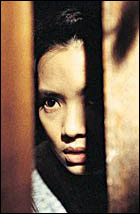Le Cerf-Volant
(The Kite) by Randa Chahal Sabbag
Silver Lion Prize of Grand Jury
 |
|
|
|
Exquisitely directed by Lebanese director
Randa Chahal Sabbag, Le Cerf-Volant takes place on
the border between Israel and Lebanon and tells the doomed
love story between a beautiful young Lebanese girl and and
Israeli Arab soldier standing guard on the border. Against
her wishes, the beautiful Lamia is married off by her family
to a young man over the border is Israel. In love with her
soldier and rebelling against her fate, she finally returns
to her home and an uncertain future- for a woman who has left
her husband is effectively deemed a whore. Portraying her
sexuality and aspirations with a great deal of sensitivity,
Sabbag has sketched a beautiful portrait of one young Arab
womans life. Furthermore, Sabbag also shows, in her depiction
of other women in the community, the moral strength-
and vital vulgar humour- of Lebanese women. The scenes where
the women communicate with friends and relatives on the Israeli
side by megaphone are both heart-breaking and amusing. The
film is endowed with a stirring soundtrack, including some
powerful Arab popular music. Tinged with sadness and a delicate
eroticism, Le Cerf-Volant is a lyrical, feminist film
which tells a very personal human and political tale. It is
a little gem.
Bu San (Goodbye Dragon Inn)
by Tsai Ming-Liang
| |
 |
|
|
Watching this film is a painful yet extraordinary
experience. I abhored and appreciated Bu San at the same time.
In terms of narrative, it is an anti-film. Nearly nothing
happens. There are only two brief exchanges of dialogue (respectively
surrealist and banal). Bu San indeed often goes against
the very definition of cinema: the employment of moving images.
There are numerous images in the film which remain immobile
for long minutes. You could perhaps accuse the director- Tsai
Ming-Liang- of sadism. However, with Bu San, the Chinese film-maker
offers us a provocative and intriguing experience. Ironically
and amusingly, this anti-film is about a particular cinema
in Taipei about to close down forever. Ultimately, it is also
an idiosyncratic study on the cinema itself. During Bu San
we are shown several characters- the audience of a historical
drama- a young gay Japanese man, an old man, a little boy,
a middle-aged man and a prostitute as well as the handicapped
female caretaker and the young male projectionist of the cinema.
At the end of the film it is revealed that the young woman
is in love with the projectionist. This is the only thread
of narrative the director offers. The real star of the show
however is the cinema itself. Dirty, damp and ugly, the cinema
building is a monstrosity. Always nearly deserted, it is not
cinema paradiso. Nevertheless, thematically, Bu San is about
the human need for cinema. It is shelter for the marginalised,
bizarre and lost. Particularly, it is a meeting place for
gay men and a place of nostalgia for the old. Tsai Ming- Liang
has created a surreal cinematographic place more seedy and
melancholic than romantic. Like a Kafka of the seventh art,
he also understands boredom and loneliness. Furthermore, Tsai
is exploring the language of film. The shots are consistently
beautifully composed. There is also even a reference to Eisenstein
when the caretaker is observed suddenly enraptured by the
action of the swords drama on screen. This montage of attractions
momentarily packs a surprising power. Yet it is the very static
aspect of the film which strikes us especially. The fixed
image of the interior of the cinema we see at the end of the
film is quite spell-binding. Tsais camera appears to be committed
to discovering the truth of things and emotions. Ulimately,
Bu San is a torture I would highly recommend.
|